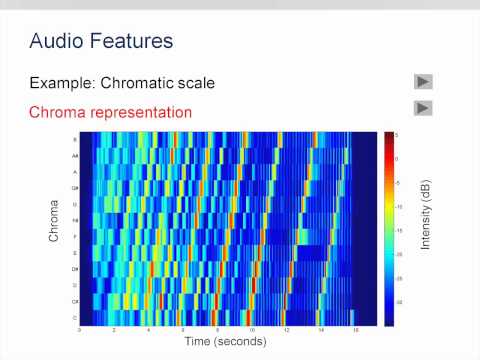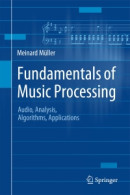Lecture: Music Processing Analysis, Winter Term 2019/2020
Please visit the education page for information on current courses.






- Instructor: Prof. Dr. Meinard Müller
- Tutor: Frank Zalkow
- Credits:
- 2.5 ECTS (Lecture only)
- 5 ECTS (Lecture with Exercises; only for Computer Science Students)
- Time (Lecture): Winter Term 2019/2020, Mo 16:15–18:00
- Time (Exercises): Winter Term 2019/2020, Mo 14:15–15:45
- Place: Am Wolfsmantel 33, Erlangen-Tennenlohe, Room 3R4.04
- 1. Lecture: 14.10.2019
- 1. Excercise: 21.10.2019
- Exam (graded): Oral examination at the end of term
- Flyer: PDF
- Dates (Lecture) (16:15–18:00, Room 3R4.04): Mo 14.10.2019, Mo 21.10.2019, Mo 28.10.2019, Mo 11.11.2019, Mo 18.11.2019, Mo 25.11.2019, Mo 02.12.2019, Mo 09.12.2019, Mo 16.12.2019, Mo 13.01.2020, Mo 20.01.2020, Mo 27.01.2020, Mo 03.02.2020
- Examination Dates (Room 3R4.03): To be announced
Format
The lecture has the following format:
- Every meeting consists of 90 minutes.
- There will be additional exercises for computer science students (see below for details).
For further information, please contact Prof. Dr. Meinard Müller.
Content
Music signals possess specific acoustic and structural characteristics that are not shared by spoken language or audio signals from other domains. In fact, many music analysis tasks only become feasible by exploiting suitable music-specific assumptions. In this course, we study feature design principles that have been applied to music signals to account for the music-specific aspects. In particular, we discuss various musically expressive feature representations that refer to musical dimensions such as harmony, rhythm, timbre, or melody. Furthermore, we highlight the practical and musical relevance of these feature representations in the context of current music analysis and retrieval tasks. Here, our general goal is to show how the development of music-specific signal processing techniques is of fundamental importance for tackling otherwise infeasible music analysis problems.
The lecture closely follows the textbook Fundamentals of Music Processing (FMP). Additionally, the FMP Notebooks offer a collection of educational material, providing detailed textbook-like explanations of central techniques and algorithms in combination with Python code examples that illustrate how to implement the theory.
The following video gives a brief impression about this course.
Course requirements
In this course, we discuss a number of current research problems in music processing or music information retrieval (MIR) covering aspects from information science and digital signal processing. We provide the necessary background information and give numerous motivating examples so that no specialized knowledge is required. However, the students should have a solid mathematical background. The lecture is accompanied by readings from the textbook Fundamentals of Music Processing (FMP) and the research literature. Furthermore, the students are required to experiment with the presented algorithms using Python and/or MATLAB.
Links
-
Accompanying textbook: Fundamentals of Music Processing
-
Additional material: FMP Notebooks
-
Related course: Music Processing – Synthesis by Maximilian Schäfer,
-
Further audio-related courses offered by the AudioLabs: AudioLabs Website
-
Information system of FAU: UnivIS
Accompanying Textbook and Notebooks
Meinard Müller
Fundamentals of Music Processing
Audio, Analysis, Algorithms, Applications
ISBN: 978-3-319-21944-8
Springer, 2015
FMP Notebooks
Comprehensive framework based on Jupyter notebooks
for teaching and learning fundamentals of music processing.
Exercises (for Computer Science Students)
The exercises, which are particularly provided for computer science students, accompany and extend the lecture Music Processing Analysis. In the exercise meetings, we review the lecture, discuss homework problems, deal with programming issues, and realize mini projects that implement basic algorithms and procedures. If you have any questions regarding the exercise, please contact Frank Zalkow.
Exercise Meeting: 21.10.2019 (14:15–15:45)
- Organization and announcements
- Introduction to FMP Notebooks
- Introduction to Python and Jupyter Notebook
- Introduction of practical exercises (Due: 18.11.2019)
- Homework:
- Familiarize yourself with Python, e.g. using the first part of the Scipy Lecture Notes
- Text Book: Ex. 1.5, Ex. 1.6, Ex. 1.8
Exercise Meeting: 28.10.2019 (14:15–15:45)
- MIDI processing, visualization, sonification, editing (FMP)
- Homework:
- Text Book: Ex. 2.1, Ex. 2.2, Ex. 2.5, Ex. 2.12, Ex. 2.14
Exercise Meeting: 11.11.2019 (14:15–15:45)
- Q & A for practical exercises (due to next week)
- Complex Numbers (FMP)
- Exponential Function (FMP)
- Discrete Fourier Transform (FMP)
- Exercise for DFT and FFT without solutions (ipynb, html)
- Homework:
- Text Book: Ex. 2.3, Ex. 2.4, Ex. 2.15
Exercise Meeting: 18.11.2019 (14:15–15:45)
- Presentation of practical exercises
Exercise Meeting: 25.11.2019 (14:15–15:45)
- Allocation of reading assignments (Due: 13.01.2020)
- Choose one of the following chapters from the Text Book: 3 (+ extras), 4, 5, 6, 7, 8.2, 8.3
- Everyone has to hand in a summary (mandatory) of the assigned book chapter as a PDF until 13.01.2020. Please send the PDF via e-mail to Prof. Dr. Meinard Müller and Frank Zalkow.
- Written in English, 2 pages
- Latex sources for the summary's template (with additional explanations) can be found here: ZIP
- Kick-off presentation for course project (4 minutes) (Due: 02.12.2020)
- Shortly present the topic of your reading assignment (no technical details, but describe the task)
- Present how this task relates to the music of your personal interest
- Present the goal of your course project
- Please send all the material you want to show during the presentation (power point, pdf, audio file) to Frank Zalkow no later than 02.12.2020 10 AM.
- Fast Fourier Transform (FFT)
- Homework:
- Text Book: Ex. 3.3, Ex. 3.4, Ex. 3.5, Ex. 3.6
- Text Book: Ex. 3.7, Ex. 3.8, Ex. 3.10, Ex. 3.13
Exercise Meeting: 2.12.2019 (14:15–15:45)
- Kick-off presentations for course projects
- Fast Fourier Transform (FFT), continuation of notebook from 11.11.2019
Exercise Meeting: 27.1.2020 (14:15–15:45)
- Demo Day: Final presentations for course projects
Topics
- Introduction
Slides (PDF), Handouts (6 slides per page) (PDF) - Overview
Slides (PDF), Handouts (6 slides per page) (PDF) - Music Representations
Slides (PDF), Handouts (6 slides per page) (PDF)
Literature: Chapter 1 - Audio Features (Fourier Transform, Spectrogram, Pitch, Chroma)
Slides (PDF), Handouts (6 slides per page) (PDF)
Handwritten Notes (Fourier Transform as Optimization Problem) (PDF)
Literature: Section 2.1, Section 3.1 - Music Synchronization (Dynamic Time Warping)
Slides (PDF), Handouts (6 slides per page) (PDF)
Literature: Section 3.2, Section 3.3 - Music Structure Analysis
Slides (PDF), Handouts (6 slides per page) (PDF)
Literature: Chapter 4 - Harmony Analysis
Slides (PDF), Handouts (6 slides per page) (PDF)
Literature: Chapter 5 - Tempo and Beat Tracking
Slides (PDF), Handouts (6 slides per page) (PDF)
Literature: Chapter 6 - Audio Retrieval
Slides (PDF), Handouts (6 slides per page) (PDF)
Literature: Chapter 7 - Audio Decomposition
Slides (PDF), Handouts (6 slides per page) (PDF)



